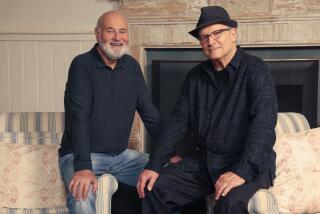Bill, Dave Make Their Mark With ‘The Bob Book’ : Names: The authors examine the moniker backward and forward. They find neither kings nor popes, but men with ‘a solid sense of sameness’ who will not be robbed of their identity.
Bob gave his camera lens a last-minute swipe with his shirt-sleeve and said what was on both our minds.
“What do these guys know, Bob?” he asked. “Their names are David and Bill.”
Good question. We had come to see David Rensin and Bill Zehme, authors of “The Bob Book,” a newly published paperback that purports to examine the name Bob backward and forward. We had come skeptical. And back at the office, another Bob was waiting the same way to edit our story.
There has never been a President named Bob or a King Bob or a Pope Bob, of course. But Rensin and Zehme have decided that men named Bob are men who get things done.
True, Bobs do “enjoy a solid sense of sameness.” But they are decent, dependable types who instinctively make the most of a bad situation, according to the book. Bobs are sensible, approachable, likable and reliable. Not to mention predictable.
Nobody named Bob could have ever written “The Bob Book,” said Rensin, 41, of Sherman Oaks. That’s because Bobs are too pragmatic and unpretentious. Bobs don’t wear berets or quote Nietzsche or hang out at Renaissance fairs, he said. “They don’t take themselves seriously.”
But “The Bob Book” does.
It includes the results of the first-ever survey of men named Bob that purports to chart their fears, fantasies and favorite after-shave lotions. “Bobs appreciate scientific reality,” Rensin said. “They need to see cold, hard data.”
The poll shows that Bobs hate wasted time, fake accents and phony compliments about their ties. It suggests that Bobs are slaves only to their own minimalist style. “Bobs not only like the way a La-Z-Boy recliner feels, they actually like the way it looks,” the survey found.
“This is the first sociological study of the common man,” said Zehme, 32, who divides his time between the Mid-Wilshire district and Chicago. “It should be the bible of the 1990s.”
Zehme and Rensin said they decided to write about the ultimate common man as a break from their regular jobs. Zehme interviews celebrities for Rolling Stone; Rensin does similar work for Playboy.
Rensin said he became interested in Bobs when he “started seeing the name everywhere”--including a freeway off-ramp near San Francisco where he once spied a restaurant
called SmorgaBob’s.
Bobs are made, not born, the pair discovered.
Virtually all Bobs start out as Roberts. That moniker was the most popular name for newborn boys in 1925, 1940 and 1950, according to the book. It ranked third in 1960, second in 1970 and 17th in 1984.
But Bobs find the name Robert too stuffy. Their mothers undoubtedly called them Bobby, but that is too frothy for a grown-up. To most Bobs, Robs are too slick and Robbys are too wimpy, the book asserts.
“Look at yourself, Bob. You chose to be Bob. You could be Robert,” Rensin said, glancing at the two of us. “But you picked Bob. You too, Bob.”
The pair trace the first Bob back to about 1721, when it was derived from the Norman name Hroedebrecht.
Zehme and Rensin sprinkle findings from their survey throughout much of the 176-page book, which includes chapters on “The Romantic Bob” and “Bad Bobs (The Rarest Breed).”
Bob big boys who completed the survey include comedians Bob Hope, Bob Newhart and Bob Saget, game show hosts Bob Barker and Bob Eubanks, sports figures Bob Welch, Bob Feller and Bob Richards, entertainers Buffalo Bob Smith and the late Bob Cummings and politicians Sen. Bob Dole (R-Kan.) and Gov. Bob Miller (D-Nev.).
“Bobs are the connecting tissue of American society,” said Rensin. “Bob is back to basics.”
“Bobs speak of American values. Little else in the world seems as OK as Bob,” said Zehme.
Bob snapped his picture of the two authors. He pronounced them a good reflection of Bobs.
“Frankly, Bob, I think they’re a couple of good Joes,” he said.
Yessirree, Bob.
This story was edited by Bob Welkos.
More to Read
Sign up for our Book Club newsletter
Get the latest news, events and more from the Los Angeles Times Book Club, and help us get L.A. reading and talking.
You may occasionally receive promotional content from the Los Angeles Times.








